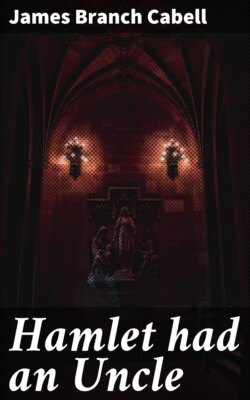Читать книгу Hamlet had an Uncle - James Branch Cabell - Страница 11
На сайте Литреса книга снята с продажи.
Оглавление8
Table of Contents
THE LETTER THAT FENGON WROTE IN HIS PERPLEXITY
Table of Contents
We must now speak about the extreme sorrow of Fengon during the while that he wrote the letter which asked the King of Deira to have Hamlet disposed of, either with a sword or a spear or a battle-axe (inasmuch as no person who died otherwise could enter into Valhalla), at the first instant which fell in with the King of Deira's convenience. Well! and Edric could attend to the matter at once, because under a civil cloaking of obtuseness, both Edric and Wiglerus knew that Hamlet was Fengon's son. Edric would quite understand that no proper-minded father would be contriving the death of his own son unless a step so unordinary for paternal affection were highly urgent.
It was, nevertheless, an ironic circumstance--Fengon reflected, as he folded up his letter and afterwards closed it with the seal of the King of Jutland--that Hamlet should be doomed by precisely those traits which Fengon most heartily admired in him. The young man, it seemed, had forethought and intelligence and a rare gift for acting; Fengon rejoiced, pardonably, to have begotten any offspring so accomplished. Even the boy's one error, in trusting his mother, was a venial offence in anybody so young; not until middle-age did you learn that no human being could be trusted with safety. Fengon thought proudly about what a first-rate king Hamlet might have made, and of the delight with which Fengon would have reared an heir so promising, if only a so dear indulgence had been permitted to dulcify his declining days. But the boy likewise had inherited that mild pertinacity which marked Fengon's own character: the boy had wholly resolved to murder Fengon; and murder Fengon he would, unless with a father's fondness seasoned never so slightly with firmness, you dissuaded Hamlet from committing the dreadful crime of parricide by the sole means in your power.
You might tell him the truth about his parentage? It was a notion to which Fengon, after weighing it, could not grant ponderability. If Hamlet were the son of dull-witted Horvendile, such would have been the obvious solution; the boy, like your loud-mouthed dear brother, could have been hoodwinked into believing whatever you told him; and so would have stayed harmless. But the son of Fengon, it appeared, had the intelligence of Fengon; he would see, just as in the same ticklish circumstances Fengon himself would have seen, how plain, and in fact how flagrant, was the intended deceit. The shrewd hard-headed youngster would pretend docilely to believe; and then, by and by, at the first chance which offered, then Hamlet would kill. So the truth here would be unconvincing, precisely because it was the truth. There was no help for it. Fate was just as inevitably compelling Fengon to assist Hamlet into Valhalla as fate had once bullied Fengon into raising Horvendile towards the same blessed estate.
It was all quite deplorable, and it seemed rather unfair, the King of Jutland reflected--this way in which, through no fault of his, he was being forced to part, one by one, with the persons most dear to him. It was enough to depress anybody who by nature had Fengon's affectionate and peace-loving disposition. He was not in the least bit surprised when, of a sudden, he hiccoughed, because continued worrying always did upset his digestion nowadays.
As you got on in life, your digestion became a factor wholly unpredictable. Your physicians talked very gravely, and they looked at you with a low-minded air of reserving judgment, and of exercising an impolite amount of tact: but what, after all, did they ever do about it, except to give you disgusting and quite inefficient drugs! So did it come about that, after the already considerable annoyance of having to contrive the death of your only son, now you would have once more to begin taking that unpleasant purple stuff before every meal. Such were the drawbacks incidental to possessing a kindly nature and a tender heart, in the hard matter-of-fact circumstances of modern civilization.
Fengon sighed resignedly. He sent for the Earls Haakon and Olaf, and he gave them instructions, along with his letter.
